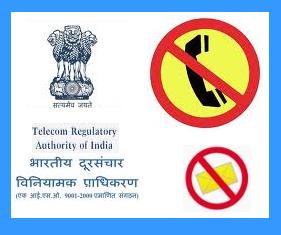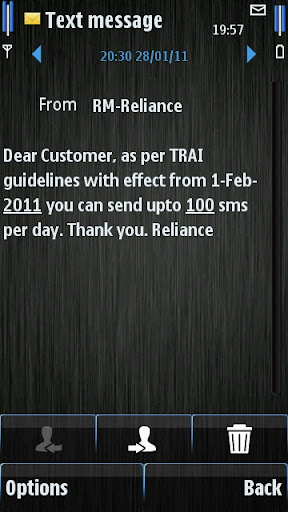TRAI’s new Spam Call and SMS regulations inhibit the open ecosystem in the VAS industry, especially the content businesses, and give more power to telecom operators to control what is in their pipe, without holding them accountable: there are guidelines, but no punitive damanges for indiscretions and oversight from telecom operators, but allows them to punish others at their discretion. However, there is no doubt that there was abuse of the open SMS pipe in India (they had it coming), and these stringent guidelines are likely to address several issues, even if they may create more issues. From a consumer perspective, she is best placed while in the NCPR, and in a worst case scenario, will at least be able to identify the spammer if not on the NCPR.
 Please note that this is our reading of the regulations (with some suggestions from Mobile VAS companies that we agree with), and we’re open to correction. If there are any issues we may have missed, please leave a message, or contact nikhil [at] medianama.com. So, some issues:
Please note that this is our reading of the regulations (with some suggestions from Mobile VAS companies that we agree with), and we’re open to correction. If there are any issues we may have missed, please leave a message, or contact nikhil [at] medianama.com. So, some issues:- Punishes the intermediary or the telemarketer? With billions of messages, the aggregator, just like the telecom operator, has no control over the messages being sent via the system. So if XYZ Bank has six complaints ratified against it, will the intermediary be disconnected or just the bank? Is there safe harbor for the intermediary? If the intermediary is protected, then that means that several entities entity will have to register as a telemarketer: if MediaNama is sending updates via using Google SMS, or a community on SMS Gupshup also have to register as a telemarketer, and pay Rs. 10000 and deposit Rs. 1 lakh deposit? For enterperise messaging, will every SME will have to do the same? This doesn’t augur well for the enterprise messaging business.
 - Kills individual SMS brands? If, however, intermediaries have to register as telemarketers, in order to facilitate message sending, then it also affects individual brands: For example, responses or messages from 9232232665 (92-FACEBOOK), will have to come through with the name of the intermediary they tie up with. There is no clear alphanumeric identifier for a brand, and each sender via each telco has a unique ID.
- Kills individual SMS brands? If, however, intermediaries have to register as telemarketers, in order to facilitate message sending, then it also affects individual brands: For example, responses or messages from 9232232665 (92-FACEBOOK), will have to come through with the name of the intermediary they tie up with. There is no clear alphanumeric identifier for a brand, and each sender via each telco has a unique ID.- Too much power in the hands of the telecom operator: there is no option for a telemarketer or legitimate content distributor to present his case. It’s a six strike policy, with the telecom operator playing judge, jury and executioner. No redressal system for the telemarketer has been identified in the guidelines, in case of false accusations (more on ID spoofing below).
- One category fits all? What about selective opt-in? Lets say I want to opt in for messages from MediaNama’s hosting service provider E2E Networks, for messages informing me that the server is down. Messages from them will be in the IT category (6). By opting in for the IT category, am I thus opening myself to ALL promotional messages from category 6 – including Broadcasting, Communication and Entertainment? Will, say, STAR Plus now be able to send me messages informing me of the latest soap? The other thing is that even network-status messages from our hosting service provider will be deemed to be commercial communication, not transactional. Transactional messages are limited to certain categories (as we mentioned in our first point above).
 - Killing mobile SMS advertising? One can understand not allowing companies to slip in promotional messages to a consumer on the NCPR who has subscribed to content, but why has the TRAI banned promotional messages within the SMS? Especially in case content messages are being treated as transactional messages, then this unnecessary clause preventing in-message advertising kills ad supported SMS content model.
- Killing mobile SMS advertising? One can understand not allowing companies to slip in promotional messages to a consumer on the NCPR who has subscribed to content, but why has the TRAI banned promotional messages within the SMS? Especially in case content messages are being treated as transactional messages, then this unnecessary clause preventing in-message advertising kills ad supported SMS content model.- What about free p2p SMS services? The way ad supported free SMS services like 160by2 work, they send the messages, but the sender ID shown is that of a person sending the message. This now prevents them from using that sender ID.
- What about number churn? Often an issue is that a subscriber churns out, and the telecom operator allocates the number to a new subscriber. In case of SMS based free community and content services like SMS Gupshup and MyToday, there is no way of accounting for this churn since the number hasn’t been unsubscribed. Will the NCPR account for this number churn, so that these messages are filtered at the source? Else there will be complaints against these companies.
- Six strikes too few? Some VAS companies that we’ve spoken with have suggested that the six strike (six legimitate complaints) policy is too risky, especially if you take into account billions of messages being sent across telecom operators.
- Risk of ID Spoofing: Since all telemarketers will have access to the NCPR data, the system is open to abuse with ID spoofing. One VAS company asked – “What stops me from getting a competitor banned by spoofing his Sender ID?”
 - What happens if the Originating and Terminating Telco are the same? Will a telecom operator register a legitimate complaint against his own telemarketer? In my experience – no. Two months ago, over two weeks, I received three calls from a marketer for Airtel, offering me a number similar to my existing number. I filed a DNC complaint – after fighting with the Airtel customer care exec who was trying to avoid filing a complaint, only to receive a message a few weeks later that my DNC complaint was incomplete. It was not, but it handn’t been registered accurately, I believe, on purpose.
- What happens if the Originating and Terminating Telco are the same? Will a telecom operator register a legitimate complaint against his own telemarketer? In my experience – no. Two months ago, over two weeks, I received three calls from a marketer for Airtel, offering me a number similar to my existing number. I filed a DNC complaint – after fighting with the Airtel customer care exec who was trying to avoid filing a complaint, only to receive a message a few weeks later that my DNC complaint was incomplete. It was not, but it handn’t been registered accurately, I believe, on purpose.On a positive note: the 100 SMS limit for consumers, who earlier were buying SMS packs of 500 SMS’, will push people towards mobile IM and the mobile Internet. So this is a big win for the Mobile Internet
Please feel free to share counter-points to our observations, in the comments, or email them to us (we’re okay with anonymous / anonymising comments, as long as the views are valid). Or, in case we’ve missed something, please share that as well.
